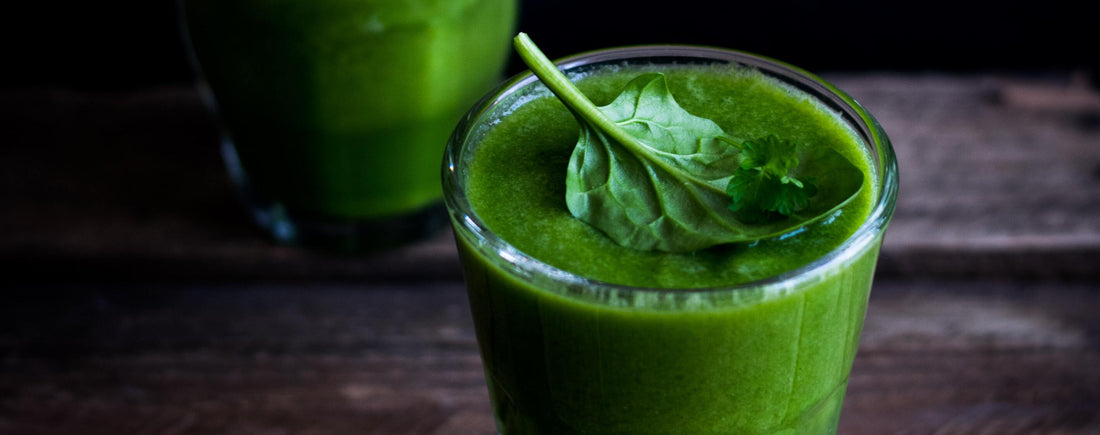Using herbs to support your nervous system is a fantastic addition to managing mild stress and anxiety. Here are three herbal smoothie recipes for you to try.
Are you interested in learning about a not-so-common way to enjoy a smoothie? Try adding herbs! I know what you're thinking—herbs in smoothies? Yes, that's right. And it's a fabulous way to add in nourishing compounds that can soothe and support your body. Think of it as a gentle herbal infusion booster with relaxation and anti-inflammatory benefits.
Finding ways to get creative in supporting the nervous system through food is one way to help reduce modern-day stressors. Incorporating herbs into your smoothie can help tame the flame of chronic stressors while at the same time elevating taste and nutrition too!
The nervous system is composed of all the nerve cells in the body. It's through the nervous system that you communicate with the outside world—no small feat! Simultaneously, many mechanisms inside your body are controlled through this intricate system—voluntarily and involuntarily.
The nervous system has two main parts: the central nervous system (CNS), which houses the brain’s nerves and spinal cord and is the system’s command center, and the peripheral nervous system (PNS), which includes all other nerves in the body. The PNS is divided into the autonomic nervous system (ANS) and the somatic nervous system (SNS).
The ANS regulates involuntary actions such as heart rate, digestion, breathing, respiratory rate, sexual arousal, and urination. The SNS governs voluntary movement and body reflexes. The ANS has two complementary parts: the sympathetic nervous system, which activates the “fight-or-flight-or-freeze” response, and the parasympathetic nervous system, which activates with the “rest-and-digest” response. Your body must have periods residing in this state, which is essential for all healing protocols, to be effective and to make decisions in the best interest of your overall health.
As you know, sustained stress can come in many forms, including environmental pollution and food sensitivities to any significant life event, triggering consistent emotional turbulence like depression, anger, anxiety, guilt, or grief, to name a few.
Inflammation is your body’s protective response to injury or damage to any ongoing prolonged stimuli mentioned. Finding ways to incorporate herbs that counter the “fight-or-flight-or-freeze” response is one way you can reduce the impact of modern-day stressors on the body. Let’s explore a few common herbs to begin your herbal smoothie journey!
1. Ashwagandha (Withania somnifera): Ashwagandha is an ancient medicinal herb. It’s also called winter cherry or Indian ginseng, and is classified as an adaptogen that can help support the body resist stressors of all kinds, whether physical, chemical, or biological. It’s a popular natural healing remedy in Ayurvedic (traditional Indian) medicine for thousands of years and packs many benefits.
Tip: For an Ashwagandha smoothie infusion, the Ashwagandha root is somewhat starchy and can easily be mixed into smoothies. Begin by using the dried powder form to add to your smoothie (see recipe below).
2. Chamomile (Matricaria chamomilla): Chamomile is considered a Nervine herb, which are herbs that support the nervous system. Nervines are a class of herbs used to treat mild-to-moderate cases of anxiety. They appear to be safe and nonaddictive and help reduce stress, anxiety, and panic. Chamomile is also anti-inflammatory, a gentle sedative antispasmodic, and is a mild pain reliever, according to Pat Crocker's The Smoothie Bible. Its uses are common for providing relief for many more ailments.
Tip: For a chamomile smoothie infusion, try this tip adapted from The Smoothie Bible (pg. 128): Using a teapot, pour 1/2 cup of boiling water over 2 tablespoons of fresh flower heads. Cover and steep for 10 minutes. Let it cool and use to replace 1/2 cup liquid in smoothie recipes (see recipe below).
3. Lavender (Lavandula angustifolia or Lavandula officinalis): This delicate herb has been used to provide relief for a range of conditions—from insomnia and anxiety to depression and fatigue, according to studies. Traditionally, lavender is shown to have various therapeutic and curative properties, ranging from inducing relaxation to treating parasitic infections, burns, insect bites, and even spasms, according to the Evidenced Based Complement Alternative Medicine. Additional studies also show that lavender produces slight soothing, calming, and sedative effects when its scent is inhaled.
Tip: For a lavender smoothie infusion, try this tip adapted from The Smoothie Bible (pg. 132): In a teapot, pour 1/2 cup boiling water over 2 teaspoons of chopped fresh lavender flowers. Cover and steep for 15 minutes. Cool and use to replace 1/2 cup liquid in smoothie recipes (see recipe below).
Here are three nourishing herbal smoothies.
Ingredients
Directions
Place ingredients in a blender and blend until smooth! Serve immediately.
Serves 2
Ingredients
Directions
Place ingredients in a blender and blend until smooth! Serve immediately.
Serves 2
Ingredients
Directions
Place ingredients in a blender and blend until smooth! Serve immediately.
Serves 2
Using herbs and other types of food to support your nervous system is a fantastic addition to supporting mild stress and anxiety cases. If you are experiencing mental health conditions that are more severe and feel overwhelming, please contact your primary care doctor or a mental healthcare provider to seek counseling or therapeutic options.
*Editor’s Note: The information in this article is intended for your educational use only and is not a substitute for professional medical advice, diagnosis, or treatment. Always seek the advice of your physician or other qualified health providers with any questions you may have regarding a medical condition and before undertaking any diet, supplement, fitness, or other health programs.
Ready to take control of your health? Download the Chopra App for personalized well-being guidance you can access anywhere.
Are you interested in learning about a not-so-common way to enjoy a smoothie? Try adding herbs! I know what you're thinking—herbs in smoothies? Yes, that's right. And it's a fabulous way to add in nourishing compounds that can soothe and support your body. Think of it as a gentle herbal infusion booster with relaxation and anti-inflammatory benefits.
Finding ways to get creative in supporting the nervous system through food is one way to help reduce modern-day stressors. Incorporating herbs into your smoothie can help tame the flame of chronic stressors while at the same time elevating taste and nutrition too!
The Nervous System 101
The nervous system is composed of all the nerve cells in the body. It's through the nervous system that you communicate with the outside world—no small feat! Simultaneously, many mechanisms inside your body are controlled through this intricate system—voluntarily and involuntarily.
The nervous system has two main parts: the central nervous system (CNS), which houses the brain’s nerves and spinal cord and is the system’s command center, and the peripheral nervous system (PNS), which includes all other nerves in the body. The PNS is divided into the autonomic nervous system (ANS) and the somatic nervous system (SNS).
The ANS regulates involuntary actions such as heart rate, digestion, breathing, respiratory rate, sexual arousal, and urination. The SNS governs voluntary movement and body reflexes. The ANS has two complementary parts: the sympathetic nervous system, which activates the “fight-or-flight-or-freeze” response, and the parasympathetic nervous system, which activates with the “rest-and-digest” response. Your body must have periods residing in this state, which is essential for all healing protocols, to be effective and to make decisions in the best interest of your overall health.
As you know, sustained stress can come in many forms, including environmental pollution and food sensitivities to any significant life event, triggering consistent emotional turbulence like depression, anger, anxiety, guilt, or grief, to name a few.
Inflammation is your body’s protective response to injury or damage to any ongoing prolonged stimuli mentioned. Finding ways to incorporate herbs that counter the “fight-or-flight-or-freeze” response is one way you can reduce the impact of modern-day stressors on the body. Let’s explore a few common herbs to begin your herbal smoothie journey!
3 Herbal Allies to Nourish Your Nerves
1. Ashwagandha (Withania somnifera): Ashwagandha is an ancient medicinal herb. It’s also called winter cherry or Indian ginseng, and is classified as an adaptogen that can help support the body resist stressors of all kinds, whether physical, chemical, or biological. It’s a popular natural healing remedy in Ayurvedic (traditional Indian) medicine for thousands of years and packs many benefits.
Tip: For an Ashwagandha smoothie infusion, the Ashwagandha root is somewhat starchy and can easily be mixed into smoothies. Begin by using the dried powder form to add to your smoothie (see recipe below).
2. Chamomile (Matricaria chamomilla): Chamomile is considered a Nervine herb, which are herbs that support the nervous system. Nervines are a class of herbs used to treat mild-to-moderate cases of anxiety. They appear to be safe and nonaddictive and help reduce stress, anxiety, and panic. Chamomile is also anti-inflammatory, a gentle sedative antispasmodic, and is a mild pain reliever, according to Pat Crocker's The Smoothie Bible. Its uses are common for providing relief for many more ailments.
Tip: For a chamomile smoothie infusion, try this tip adapted from The Smoothie Bible (pg. 128): Using a teapot, pour 1/2 cup of boiling water over 2 tablespoons of fresh flower heads. Cover and steep for 10 minutes. Let it cool and use to replace 1/2 cup liquid in smoothie recipes (see recipe below).
3. Lavender (Lavandula angustifolia or Lavandula officinalis): This delicate herb has been used to provide relief for a range of conditions—from insomnia and anxiety to depression and fatigue, according to studies. Traditionally, lavender is shown to have various therapeutic and curative properties, ranging from inducing relaxation to treating parasitic infections, burns, insect bites, and even spasms, according to the Evidenced Based Complement Alternative Medicine. Additional studies also show that lavender produces slight soothing, calming, and sedative effects when its scent is inhaled.
Tip: For a lavender smoothie infusion, try this tip adapted from The Smoothie Bible (pg. 132): In a teapot, pour 1/2 cup boiling water over 2 teaspoons of chopped fresh lavender flowers. Cover and steep for 15 minutes. Cool and use to replace 1/2 cup liquid in smoothie recipes (see recipe below).
Here are three nourishing herbal smoothies.
Ashwagandha Banana and Almond Butter Smoothie
Ingredients
- 1 banana, frozen
- 1 cup oat milk, unsweetened
- 1/4 cup raw almond butter
- 1 tablespoon Ashwagandha powder
- 1 teaspoon cinnamon powder
- A dash of honey (only if you'd like to add a hint of sweetness)
Directions
Place ingredients in a blender and blend until smooth! Serve immediately.
Serves 2
Calming Cherry Chamomile Smoothie
Ingredients
- 1 cup coconut milk
- 1⁄2 cup cold chamomile tea
- 1 cup frozen cherries
- 1 cup frozen mangos
- 1 teaspoon flax seeds
- 1 tablespoon coconut oil
- A few drops of liquid stevia
- 1 teaspoon of pure vanilla extract (optional)
Directions
Place ingredients in a blender and blend until smooth! Serve immediately.
Serves 2
Lavender and Wild Blueberry Smoothie
Ingredients
- 1 cup of frozen wild blueberries
- 1/2 banana
- 1/2 avocado
- 1⁄2 cup cold lavender tea
- 1 cup of your favorite plant-based milk of choice
- 1 teaspoon of pure vanilla extract
- A few drops of liquid stevia (optional)
- 1/2 cup of ice
Directions
Place ingredients in a blender and blend until smooth! Serve immediately.
Serves 2
Sip and Soothe—and Be Aware
Using herbs and other types of food to support your nervous system is a fantastic addition to supporting mild stress and anxiety cases. If you are experiencing mental health conditions that are more severe and feel overwhelming, please contact your primary care doctor or a mental healthcare provider to seek counseling or therapeutic options.
*Editor’s Note: The information in this article is intended for your educational use only and is not a substitute for professional medical advice, diagnosis, or treatment. Always seek the advice of your physician or other qualified health providers with any questions you may have regarding a medical condition and before undertaking any diet, supplement, fitness, or other health programs.
Ready to take control of your health? Download the Chopra App for personalized well-being guidance you can access anywhere.






















